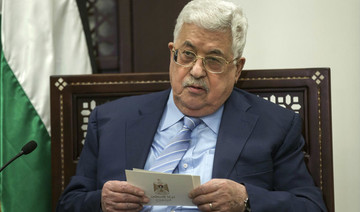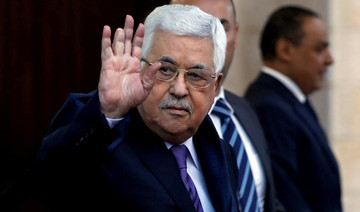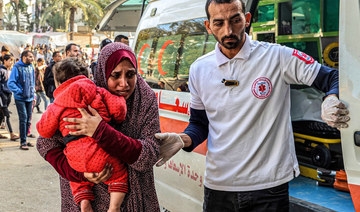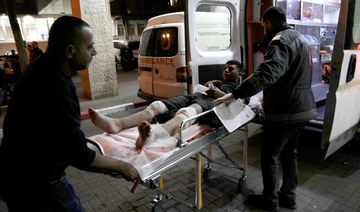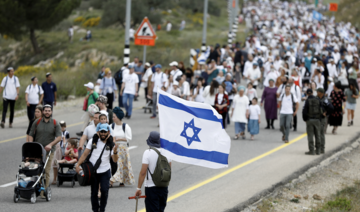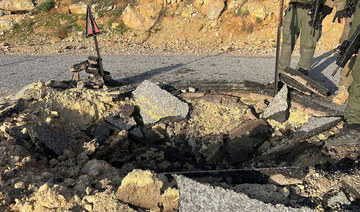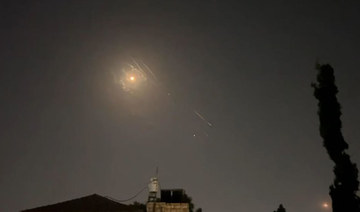RAMALLAH: Palestinian president Mahmud Abbas left hospital on Monday after eight days of treatment for pneumonia that led to intense speculation over the 83-year-old’s condition and who will eventually replace him.
Dressed in a suit as usual and walking without assistance, Abbas gave a short statement on being discharged, saying he planned to be back at work in his office as normal on Tuesday.
“Thanks to God, I left the hospital today in good health and return to work starting tomorrow,” he said, speaking vigorously and with his two sons by his side.
He thanked all international leaders who had called about his health and wished him well.
The hospital stint came at a time of heightened US pressure on Abbas and the Palestinian Authority.
Some analysts said Abbas would now seek to refocus on work and downplay talk of stepping down. He is expected to preside over a meeting of the central council of his Fatah party on Tuesday.
Known to be a heavy smoker, Abbas was admitted on May 20 to the Istishari Arab Hospital near Ramallah in the occupied West Bank with complications following an ear operation, including high fever.
Officials have since said he was being treated for pneumonia.
His extended hospitalization led to widespread speculation over whether his condition was worse than the details being disclosed.
No successor is publicly in line for the Palestinian presidency, which has added to concerns over Abbas’s health.
Abbas won a four-year term as president in 2005, but he has since remained in office without further elections.
He argues the split between his Fatah party and the Hamas movement, which controls the Gaza Strip, has made elections politically impossible.
A moderate, Abbas has been involved in decades of negotiations with Israel but is unpopular among Palestinians, with the majority wanting him to step down.
Many Palestinians see his approach to negotiations as having failed to end the Israeli occupation and are no where near the goal of securing statehood.
Israeli officials, while criticizing what they see as his intransigence, greatly value the security coordination which his administration has provided.
Abbas succeeded Yasser Arafat, the charismatic keffiyeh-wearing leader who was revered by Palestinians.
Though Abbas has been valued by the international community due to his belief in negotiations and stated opposition to violence, he has struggled to meet Palestinians’ expectations left behind by Arafat.
In recent months, Abbas has faced what the Palestinians see as the blatant bias of US President Donald Trump’s administration.
Abbas froze all ties with the White House over Trump’s decision to recognize Jerusalem as Israel’s capital
The United States has also frozen tens of millions of dollars in aid to the United Nations agency for Palestinian refugees and has threatened to close the office of the Palestine Liberation Organization in Washington.
Abbas has sharpened his rhetoric against US officials.
In a recent speech, he called US ambassador to Israel David Friedman, who has been a supporter of Israeli settlements in the West Bank, a “son of a dog.”
Abbas made reference to Trump’s Jerusalem declaration when leaving the hospital, suggesting it had weighed heavily on him.
“If the issue of Jerusalem brought us to the hospital, we wanted to get out of the hospital to make Jerusalem the capital of Palestine,” he said.
Israel sees the entire disputed city as its capital, while the Palestinians want the annexed eastern sector as the capital of their future state.
Nour Odeh, a political analyst based in Ramallah, said the president would seek to use the Fatah central council meeting to refocus on the opposition to Israeli and US policy.
“I don’t doubt that the recent events will have an impact — the president is not young,” she said, adding he seemed to have been suffering from fatigue in the weeks before his hospitalization.
Diana Buttu, a former Abbas aide who became a fierce critic, said Abbas would seek to quash all talk of succession.
“He is going to pretend this whole thing didn’t happen. It will be business as usual, as though an 83-year-old didn’t have serious pneumonia,” she told AFP.
“Other politicians know that if they talk about succession they will be out.”
Palestinian President Abbas leaves hospital after eight-day stay
Palestinian President Abbas leaves hospital after eight-day stay

- Palestinian President Mahmoud Abbas is released from hospital after an eight-day stay and treatment for what officials said was a lung infection
- Abbas thanks all international leaders who had called about his health and wished him well
Denmark to close its Iraq embassy
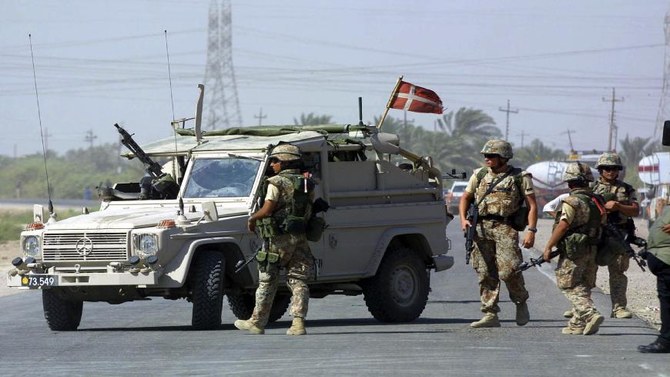
The diplomatic mission in Baghdad was formally opened in 2020 to support the Danish command over and contribution to the NATO Mission Iraq (NMI).
The majority of the Danish military contribution has since been withdrawn.
Egypt, UN coordinator stress need for smooth aid delivery to Gaza
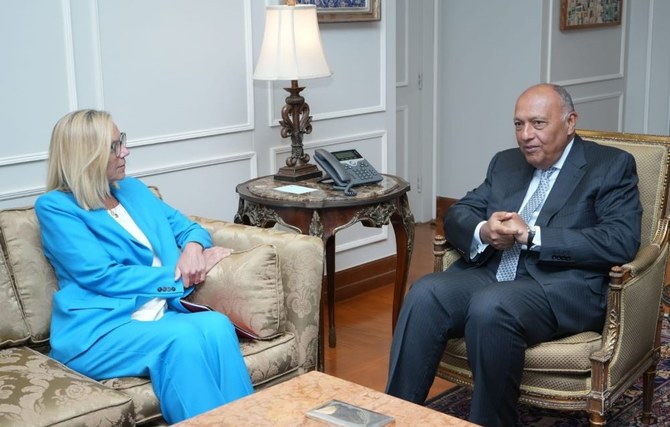
- Sameh Shoukry and Sigrid Kaag discussed the various facets of the humanitarian crisis in the besieged territory
- Kaag said she appreciated the pivotal role played by Egypt in containing the humanitarian repercussions of the crisis
CAIRO: Egypt’s Foreign Minister Sameh Shoukry and the UN’s coordinator for the Gaza Strip Sigrid Kaag on Tuesday discussed the various facets of the humanitarian crisis in the besieged territory, the volume and quality of aid entering it and the priorities regarding the type of aid.
The meeting took place at the Foreign Ministry’s headquarters in Cairo where the two sides reviewed the ongoing endeavors with various parties to expedite the launch of the UN mechanism as soon as possible.
They affirmed the inevitability of intensifying the volume of aid to meet the needs of the Palestinian people as well as providing the necessary protection for international relief personnel present in the Strip.
Shoukry reaffirmed the legal and humanitarian responsibility incumbent upon international parties to ensure the implementation of the provisions of Security Council Resolution 2720 and all other UN resolutions relevant to the situation in Gaza.
He stressed the necessity of dealing seriously and urgently with the humanitarian crisis in Gaza by reaching an immediate and permanent ceasefire, as well as sustaining aid access in a full, safe and intensive manner to all areas, the removal of impediments imposed by Israel in this regard and the opening of all land crossings to increase the flow of aid.
Kaag affirmed her keenness to continue coordination and consultation with Egypt to carry out her duties. She said she appreciated the pivotal role played by Egypt in containing the humanitarian repercussions of the crisis as well as the existing cooperation between the Egyptian Red Crescent, Egyptian civil society organizations and UN relief agencies to deliver aid.
Arab League condemns surge in West Bank settler attacks
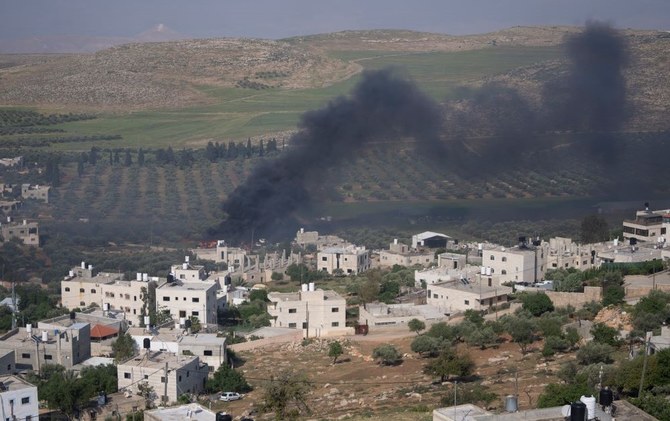
- Gamal Roshdy: Incidents of violent crimes, arson and property destruction perpetrated by armed settlers have seen a noticeable surge
- Tensions in the West Bank have been especially high since the outbreak of the Israel-Hamas war in the Gaza Strip on Oct. 7
CAIRO: The Arab League on Tuesday strongly denounced relentless attacks carried out by Israeli settlers on Palestinian cities and towns across the West Bank.
“These attacks, often perpetrated under the tacit approval and protection of Israeli authorities, are exacerbating a pervasive state of impunity and continued oppression of Palestinian lives and properties,” the league said in a statement.
Gamal Roshdy, the secretary-general’s spokesperson, said that while daily atrocities committed by Israeli forces in Gaza demand attention, they must not overshadow the escalating violence in the West Bank.
He added: “Incidents of violent crimes, arson and property destruction perpetrated by armed settlers have seen a noticeable surge, facilitated by a settler-led government that shields them from accountability.”
Roshdy warned that the imposition of sanctions by some countries on settlers, though a belated gesture, falls short of addressing the escalating crisis and safeguarding Palestinian civilians in the West Bank.
He called for action from the UN Security Council to end the “shameful cycle and the culture of impunity prevailing in the West Bank,” and to “hold these settlers accountable for their reprehensible crimes against the Palestinian people.”
Tensions in the West Bank have been especially high since the outbreak of the Israel-Hamas war in the Gaza Strip on Oct. 7.
On Friday, dozens of Israeli settlers stormed a Palestinian village in the Israeli-occupied West Bank, shooting at and burning houses and cars.
The Palestinian Foreign Ministry has strongly condemned the settler violations and crimes against Palestinians across the West Bank.
King Abdullah II: Jordan won’t become ‘theatre of war’ between Israel and Iran
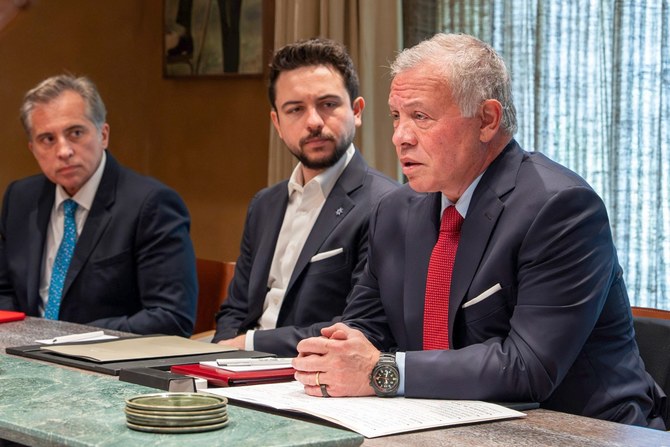
- King of Jordan reinforced the nation's commitment to upholding its security and sovereignty
- He said Jordan's aim was to safeguard its own sovereignty rather than defend Israel
DUBAI: Jordanian King Abdullah II said Tuesday that his country must not become ‘the theatre of a regional war’ after Jordan intercepted multiple missiles and drones when Iran attacked Israel at the weekend.
The king reinforced the nation's commitment to upholding its security and sovereignty above all other considerations. He stressed Jordan's aim was to safeguard its own sovereignty rather than defend Israel.
Last weekend, Jordan was among a group of nations that helped Israel shoot down missiles, rockets and attack drones launched by Iran and its allies at Israel.
Earlier on Tuesday, Jordan's Foreign Minister Ayman Safadi said the international community should stop Israeli Prime Minister Benjamin Netanyahu from "stealing" attention away from Gaza by escalating his confrontation with Iran.
In remarks during a press conference with his German counterpart in Berlin, Safadi said Iran had responded to the attack against its consulate and had announced that it did "did not want to escalate further".
"We are against escalating. Netanyahu wants to draw attention away from Gaza and focus on his confrontation with Iran," Safadi added.
Iran's weekend attack caused modest damage in Israel and wounded a 7-year-old girl. Most missiles and drones were shot down by Israel's Iron Dome defence system and with help from the US, Britain, France and Jordan.
Iran -- which labelled its attack an act of self-defence after a deadly Israeli strike on its Syria consulate -- warned Jordan it could be “the next target”, a military source was reported as saying by Iran's Fars news agency.
(with agencies)
Israel’s old Lebanese allies grapple with new Hezbollah threat
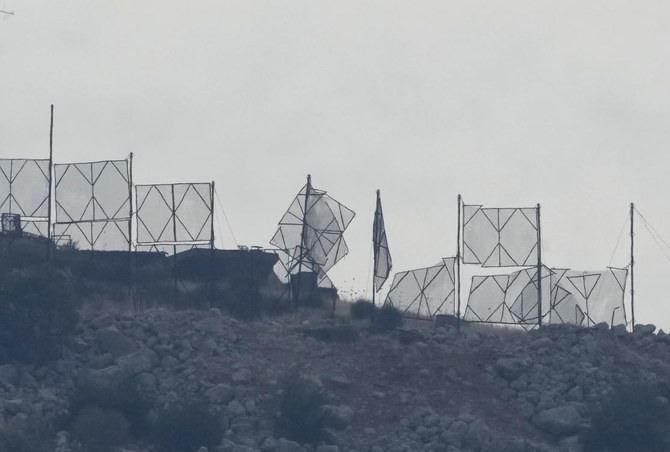
- The South Lebanon Army was a mostly Christian militia recruited by Israel when it occupied south Lebanon in the 1980s and 1990s
The looming threat of a war between Israel and Hezbollah in Lebanon is reviving painful memories for former Lebanese militiamen and their families who fled to Israel, their erstwhile ally, more than 20 years ago.
The South Lebanon Army was a mostly Christian militia recruited by Israel when it occupied south Lebanon in the 1980s and 1990s.
The Zadalnikim, as the SLA’s former members are known in Israel from the group’s Hebrew acronym, sought shelter south of the border in the aftermath of Israel’s sudden withdrawal from Lebanon in May 2000, fearing reprisals from Hezbollah, whom they had fought for years in a brutal and uncompromising conflict.
Iran-backed Hezbollah — a Hamas ally with a large arsenal of rockets and missiles — has exchanged fire with Israeli forces almost daily since Hamas attacked Israel on October 7 triggering war in Gaza.
In response, Israel has carried out strikes deeper and deeper into Lebanese territory, targeting several Hezbollah commanders.
A strip several kilometers (miles) wide on either side of the border has become a de facto war zone, emptied of its tens of thousands of civilian residents.
“They told us to prepare for two weeks in a hotel in Tiberias” in northern Israel, said Claude Ibrahim, one of Israel’s more prominent Lebanese collaborators.
“It’s already been six months. I hope it won’t last 24 years,” he told AFP, referring to his exile from Lebanon.
Ibrahim, a former right-hand man of the late SLA commander Antoine Lahad, was evacuated from the northern Israeli town of Kiryat Shmona, near the Lebanese border, in October when the entire city was emptied.
“It’s as if history repeated itself... generation after generation,” he said, referring to how the Zadalnikim had to flee their homeland after years spent moving from village to village during the Lebanese civil war of the 1970s and 1980s.
Of the 6,000 to 7,000 Lebanese who fled to Israel in May 2000, around 3,500 still live in Israel, according to the authorities. They are registered with the interior ministry as “Lebanese of Israel” and were granted citizenship in 2004.
Shortly after their arrival in Israel — where authorities only partly took responsibility for them — many moved on to Sweden, Germany or Canada. Others returned to Lebanon, where they were tried for collaboration with Israel.
All former SLA members in Israel have relatives in Lebanon, mostly in villages in the south, a few kilometers (miles) from the Israeli border.
Few agreed to be interviewed out of fear of reprisals against their families in Lebanon, whom they stay in touch with via third parties for the same reason.
Maryam Younnes, a 28-year-old communications student at Bar-Ilan University near Tel Aviv, was five when she arrived in Israel with her parents.
When her father, a former SLA officer, died a decade ago, they were able to bury him in their ancestral village of Debel, roughly 10 kilometers (six miles) as the crow flies from Ma’alot-Tarshiha, the northern Israeli town they moved to.
The rest of their family remained in Lebanon, in Debel and the capital Beirut.
With fears growing that the near-daily exchanges of fire across the border might escalate into a full-scale war, Younnes was worried about her relatives.
“I’m very concerned for my family, for my village (in Lebanon),” said Younnes, who sees herself as “half Lebanese, half Israeli.”
“I hope that there will be a way to protect them,” she said, if there is an all-out war with Hezbollah.
Ibrahim was equally worried, although he voiced hope that a new conflict with Israel would “finish off” his old enemy Hezbollah.
“The only solution is a big strike on Hezbollah so that it understands that there is no way forward but through peace,” he said.
Ibrahim said there was no reason Israel and Lebanon should not be at peace.
But Asher Kaufman, a history professor at Notre Dame University in Indiana who specializes in Lebanon and the wider Middle East, said attitudes in Israel had shifted significantly in the decades since the civil war and the cooperation between Lebanese Christian militias and the Israeli military.
The vision of an alliance between “Lebanese Christians and the Israelis, which was at the root of the 1982 invasion (of Lebanon by Israel) has completely collapsed.”
Israel has stopped “viewing Lebanon as the Switzerland of the Middle East,” a peaceful and prosperous country, and now sees it as “a violent quagmire it wants nothing to do with.”


